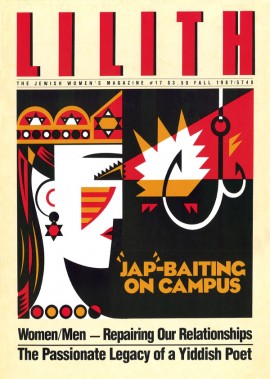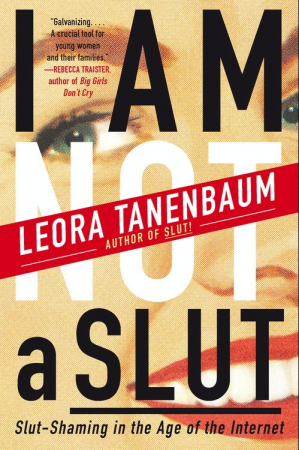
Why “I Am Not a Slut” Sounds Familiar
Susan Weidman Schneider talks to the author of the new book I Am Not a Slut about sex and the Jewish girl: the prude/slut contradiction, Jewish school dress codes, and sexual experimentation at bar at bat mitzvahs. Is the "slut" just the JAP in new clothing?
Why “I Am Not a Slut” Sounds Familiar
Girls and young women do a delicate dance between feeling sexual in a positive way and being shamed/blamed for expressing any part of that sexuality, even for giving the appearance of acting on it. There’s the good slut and the bad slut, according to Leora Tanenbaum.
In between, even with the jokiness of the term “slut” being bandied about by girls as a term of endearment, you’re shamed — as one of Tanenbaum’s teen subjects in her book I Am Not a Slut says — both for being a “prude” and for being a “whore.”
There’s an eerily familiar dynamic here. When women’s options become squeezed like this, when the field where you can operate safe from shame and baiting gets narrowed by disparaging accusations at each end, when the playing field for “appropriate” behaviors shrinks and shrinks, we see female behaviors getting strictly controlled. We see this clearly in a precursor slur — the JAP, the much-maligned and much-discussed Jewish American Princess.
Let’s revisit the JAP for a moment. In her current incarnation she is sometimes called by another name, as in the “Coasties” song popular on Midwestern campuses a few season ago, where young women thought to be of privileged backgrounds are mocked for being spoiled, wearing brand-name garments, spending “Daddy’s money,” etc.
Among the salient characteristics of the JAP — that she is emotionally dishonest, materially indulged, sexually withholding — there are paradoxes similar to those closing in on the slut. The JAP is the female who is both too passive (wants someone else to support her financially, to indulge her in her whims and moods) and also the female who is too assertive, who wants to make it on her own, who is outspoken, privileged, and wants, as one decades-old analysis put it, “the best of everything.” If we look at today’s slut through the designer sunglasses of the JAP, we see that the slut, too, is in the procrustean situation of being damned both for action and for inaction. She’s shamed if she expresses her sexuality, but if she does not, she is judged to be withholding, prudish, unpopular or — maybe even worse — “irrelevant,” as one girl put it to Tanenbaum.
We know about this squeeze from an even earlier example than the JAP. The mythological Lilith, eponym for this magazine, was in the initial stories a strong, bold creature of God, formed at the same instant and from the same dust as Adam. Intended as his equal, his peer, she fled the Garden of Eden when Adam insisted that he was her superior. That’s the nugget of the original story. Fast forward into the Medieval period, when Lilith suddenly gets a bad press. She is simultaneously frigid and a seducer of men who walk alone into dark houses at night; she’s simultaneously sterile and gives birth to 100 demon children every day. And so on. Lilith, like the JAP and the slut, ends up as the embodiment of contradictory — untenably contradictory — ideas about female behavior and attributes. Too passive and also too assertive, too manipulative and too direct, too cold and too hot. The prude and the slut. It’s an old story.
The margins get stifling, they pull in tighter and tighter. The constricting paradox of this double message — like “be smart but not too smart” — is the corset of the 21st century. It’s all about control. No wonder it sounds familiar.
by Susan Weidman Schneider
Girls Now: The Prude/Slut Contradiction
Girls’ and women’s experiences illuminate an unstable terrain in which female sexual development is fraught with tricks and traps. It’s not an accident, I believe, that the words “slut” and “ho” [for whore] are popular at the same time that adolescent girls and college-age women face a sexual contradiction of enormous significance. Repeatedly, my interviewees explained that they must prove to their peers that they are sexually sophisticated and knowing. Revealing oneself as a “prude” or sexually ignorant — for girls as well as boys — is the kiss of social death.
It means not keeping up, not developing properly, not being normal. Therefore, many girls and young women deliberately construct an identity in which they perform as a sexually empowered female to an audience of their peers, just as many boys and young men feel pressured by norms of masculinity to brag about sexual adventures.
Stephanie, a white 15-year-old girl in New York City, relates that she was called a prude when she was in the seventh grade, “when I had braces and everything. I had a really cute boyfriend, and we just hung out and didn’t do anything. Kids asked me if we’d kissed, and I said no, and they were like, ‘What?’ So they said I was a prude. And so I became so irrelevant.” (Instead of judging their peers on a scale of popularity and unpopularity, I discovered, teens deem them “relevant” or “irrelevant,” also described as being “under the radar.”) Stephanie continues, saying, “If you’re part of a group that cares about hooking up, and you’re not hooking up, then you become irrelevant.” Stephanie did not want to be rendered “irrelevant.” Who does — especially when you’re 15 years old?
This contradiction is a modification of the virgin/whore dichotomy that has plagued women since the third millennium BCE, when the ancient Sumerians divided women into the categories of wife and prostitute. Historically, two mutually exclusive sexual identities — sexually inexperienced wife/Madonna figure who engages in sexual behavior only to procreate with her husband; and sexually experienced woman/prostitute who engages in sexual behavior only for personal benefit — were available to women to embrace. This virgin/whore dichotomy gave women no space to express their sexuality without consequences.
…Never mind that being a “slut” is one hair away from performing in a socially acceptable manner. Once a girl is labeled a slut, the show is over: her performance is ruined; her reputation is in tatters.
Social media have profoundly altered the way people evaluate themselves and others. In particular, social media place girls’ and women’s physical bodies perpetually on display. Julie Zeilinger, the founder and editor of a feminist blog for teens and young adults called FBomb, observes, “Everyone is constantly visible and available — including your body and everything else about you.” Moreover, many of us believe today that our bodies should always be visible and available. We judge other female bodies, and our female bodies are always judged. Therefore, we worry about our physical selves and our sexual identities in a newly charged way. Performance and surveillance are now central to everyone’s lives, and especially so for young females.
Because the word “slut” has become so accepted and widespread in casual conversation, its sexist sting is undervalued in U.S. youth culture. As the high school teacher played by Tina Fey memorably told her female students in the 2004 movie Mean Girls, “You all have got to stop calling each other sluts and whores. It just makes it OK for guys to call you sluts and whores.” The more the word is used, the more it is accepted. When women call each other sluts, even in a lighthearted manner, they lead others to believe it’s acceptable to use the term too. When this behavior is normalized, so is sexual assault. As Kaitlyn says, “I pretty much expect to be groped and touched by random guys every time I leave my home in the morning. Girls think it’s normal for a guy to grab them at a party. The word ‘slut’ creates a physically and emotionally dangerous environment for girls.”
From I Am Not a Slut by Leora Tanenbaum (HarperCollins, 2015). Used with permission of the publisher.
Sex and the Jewish Girl
Leora Tanenbaum’s I Am Not a Slut has nothing overtly Jewish in it. In fact, Tanenbaum told Lilith that she interviewed no Jewish girls and women in her reporting. But her new book raises issues that resonate for feminist Jews. Susan Weidman Schneider has some questions for Tanenbaum.
SWS: When you discuss the pressure felt by girls and young women to present themselves in a certain way — and the criticism and shame they experience when they do — I was reminded of Lilith’s reports on the evergreen “JAP” phenomenon. Both stereotypes embody the persistent paradoxes in the messages girls and young women get: “Look good, attract guys,” on the one hand, and on the other, “You are too obsessed with what you look like/too sexually obvious.” Do you see a connection between slut-bashing and JAP-bashing?
LT: The paradox is alive and well. Girls are supposed to present themselves as sexually knowing and sophisticated, yet when and if they do they’re judged and shamed and policed. They’re supposed to be sexy, but not slutty.
It’s this impossible scenario where you have to fail if you are a teenage girl and you have overreached and crossed the invisible and constantly shifting boundary. I do see how the “JAP” and the “slut” align.
We think of Jewish parents typically raising their daughters to have agency, to “Be all you can be.” And yet a young woman runs the risk of being damned for being too assertive, and also for being too passive. “Damned if you want to be the doctor, damned if you want to marry a doctor,” is how one woman put it.
But of course what we’re not doing a good job of as parents is telling our daughters that their agency is only partial. How can we tell them they can do anything they want when this is not true! It plays out with devastating consequences.
The problem with focusing on girls’ agency without revealing how partial it is, is reflected in the dominant reflex response to sexual assault: “You must have done something wrong. You chose to dress that way, you chose to drink. You made those free-will decisions.”
Boys and men are expected to be sexually active in an uncontrolled manner, but girls and women are punished for behaving this way. We don’t want to curb our daughters’ sexuality, but we want to show them that we have contested beliefs, culturally, about what is appropriate.
Try to find a compromise — but never, ever shame your daughter about her body or her appearance. Say: “You look great in that outfit. Unfortunately, so many people in the larger world believe that these clothing choices say something else about you. They are 100% wrong. But we have to keep those people in mind in order to stay safe.”
Can we speculate about a Jewish dimension to the slut-bashing, slut-shaming, slut-denying you write about? What about the sexualization of girls at bar and bat mitzvah parties? Aside from the covert sexual behavior at some of these parties, which Lilith reported on in “It’s Not Sex!” [Winter 2003 – 2004], what about the often precociously sexy clothing of these 13-year-old girls, and the subsequent disapprobation heaped upon them by the adults who present themselves similarly?
A bar or bat mitzvah party could be a safe occasion for healthy adolescent and pre-adolescent experiment — play around with wardrobe and makeup. Playing around with sexually revealing clothes does not bother me. The problem is this: Does she feel she has to wear such a dress? And does she feel her sexuality is her primary source of power in the world? It’s problematic if this is the direction this goes in.
What about, at the other end of the spectrum, the message that girls get in many Jewish settings, that their bodies are sources of danger and temptation to boys: Tzniut! Modesty! And what about a “modesty” that trammels girls’ sexual feelings?
I’m a day school graduate myself. In Flatbush Yeshiva, the very act of having a stringent dress code was an act of policing a girl’s sexuality.



